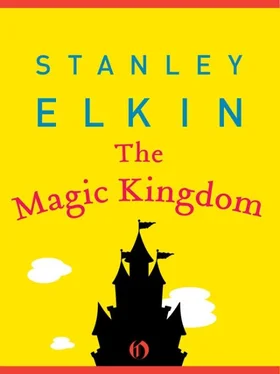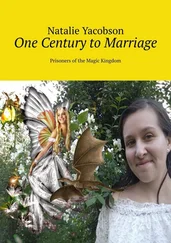At a woman with oily skin and pores like a sort of gooseflesh, visible as the apertures of chickens where their pinfeathers have been plucked. At a still handsome woman with bare, shapely, but hairy legs (hair even on the tops of her feet), but carefully trimmed as sideburns or rolled as stockings two inches below her knees; at a powerfully built man in his sixties whose chest hair, visible through his sheer tank top, had been as lovingly, patiently groomed as a high school boy’s. (Everywhere, everywhere hair — the strange feeling they had that they were among birds, the wigs, the boa, the babushka of hair beneath the woman’s chin, the piled hairdos, the thinning hair, the penciled eyebrows, the tattooed mustache and sideburns of the strange Westerner. Mudd-Gaddis’s own baldness and the chemotherapeutic fuzz of several of the children. Because everything has a reasonable explanation, and almost all had heard that hair didn’t stop growing after you died. Because everything has a reasonable explanation and hair was the gnawed, tenuous rope by which they hung on to immortality.)
Everywhere there were peculiar couples. A boy and a girl who couldn’t have been more than twelve but looked in their runt intimacy as if they could have been married. The boy held his arm protectively about the girl’s shoulder, his free hand in the pocket of his three-quarter-length trench coat as though he fondled a gun. He wore a jacket, a shirt, and a tie. His floods, honed as a knife along their permanent crease, rose above sharp, snazzy shoes. The girl, shorter than her small boyfriend, in a decent wool coat that looked as if it had been bought at a back- to-school sale, smiled wanly. Her black full hair showed signs of gray and she seemed a little nervous, wary, even long-suffering, beneath the arm of her protector, as if she knew his faults, perhaps, his diseases — which weren’t diseases in her book — his excessive drinking, his compulsive gambling, his quick fists and rude abuse.
And stared openly at the mismatched couples: at the big, powerful girls next to undersized men and the men large as football players beside bloodless, scrawny women, at the couples widely discrepant in age in open attitudes of love and regard, handholding or clutching butts, the men’s fingers casually resting along breasts as if they lolled in water. Or their arms thrown abruptly across each other’s shoulders. Sending the smug signals of secret satisfactions, like the wealthy, perhaps, like people in drag.
And at a closely supervised group of the retarded, oddly ageless, the males in overalls, the females in loose, shapeless dresses and rolled stockings, clutching one another with their short fat fingers, their strange, pleased eyes fixed in their happy Smile Faces like raisins in cakes, beaming above their neglected teeth, beaming, beaming beneath their close-cropped hair on their broad, short skulls.
(Yet most were not defective, merely aging or old, or anyway beyond that thirty- or thirty-five-year grace period that seemed to come with most lives.)
Not even needing Colin now to direct their attention, to point things out. In it themselves now, raising their voices, like people outbidding each other in some hot contest, not even listening; or, if listening, then listening for the break in the other’s discourse, for that opportune moment when they could have their say, get in their licks; or, if listening, then listening not just for the other to finish but for some generalized cue, some more or less specific tag on which they could build, add, like players of dominoes, say, or card games that followed strict suit. But generally too excited even for that. Only half listening, really, less, fractionally, marginally, seeing how it was with them and concentrating only on the essence, pith, and gist of what they would say, thinking in a sort of deliberate and polite headlines but settling finally into a kind of conversation and still using the language of that other kingdom, the one they’d come from to get to this one.
“Lord love a duck!” said Janet Order. “Just clap eyes on these gaffers.”
“My word, Janet! They’re for it, I’d say so,” Rena Morgan agreed.
“Lamb turning to mutton.” Janet sighed.
“Fright fish.”
“Blood puddles.”
“Lawks!” said Benny Maxine. “Look at the bint with the healthy arse. I’m gone dead nuts on that fanny.”
“Ooh, it’s walloping big, ain’t it?” Tony Word said.
“If it ever let off it wouldn’t ’alf make a pongy pooh,” Benny asserted.
“Like Billy-O!” Tony said.
“Good gracious me!” said Lydia Conscience. “Say what you will, my heart goes out to the old biddy what looks like someone put her in the pudding club.”
“Yar, ain’t she dishy? There’s one in every village.”
Tony Word considered. “No,” he said. “She’s just put on the nose bag. It’s simply a case of your lumping, right grotty greedguts.”
“Only loads of grub then, you think?” Lydia asked.
“Oh, yes,” said Tony. “Oodles of inner man. Tub and tuck.”
“Jesus weeps!” said illiterate Noah Cloth, looking about, his gaze settling on the little group of the retarded. “He weeps for all the potty, pig-ignorant prats off their chumps, for all the slowcoach clots and dead-from-the-neck-up dimbos, and wonky, puddled coots and gits, goofs and goons, for all his chuckleheaded, loopy muggins and passengers past praying for.”
“Put a sock in it, old man,” Benny Maxine said softly.
“For all the nanas,” Noah said, crying now. “For all the bright specimens.”
“Many’s the nosh-up gone down that cake hole,” Tony Word said, his eye fixed on the fat woman Lydia Conscience had thought pregnant. “Many’s the porky pots of tram-stopper scoff and thundering stodge through that podge’s gob,” he said without appetite.
“She’s chesty,” Rena Morgan said, weeping, of a woman who coughed. “She should put by the gaspers.”
“She’s had her day,” said Janet Order.
“Coo! Who ain’t?” Rena, sobbing, wanted to know. “Which of us, hey? Which of them?”
“Are they all on the dream holiday then?” Charles Mudd- Gaddis asked.
“All, old son, and no mistake,” Lydia Conscience said wearily.
“A shame,” he said. “Letting themselves go like that. And them with their whole lives in front of them.”
And, at last, just rudely pointing. (They could have been mutes waving at entrées, aiming at desserts in a cafeteria line.) Whirling, indiscriminate, flailing about in some random “ J’accuse” of the spontaneous. Whining, wailing, whimpering, weeping.
Because everything has a reasonable explanation. They lived in England’s cold climate. They came from a place where clothes made their men and their women. They were unaccustomed to sportswear, to shorts and the casual lightweights and washables of the near tropics. They were unaccustomed, that is, to the actual shapes of people and simply did not know that what they saw was just the ordinary let-hung-out wear and tear of years, of meals, of good times and comforts and all the body’s thoughtless kindnesses to itself. So that when Colin said what he said they believed him.
“I tell you,” he told them, “that’s you in a few years, never mind those three-score-and-ten you thought was your birthright. All that soured flesh, all those bitched and bollixed bodies. You see? You see what you thought you were missing?”
“Bodies,” Nedra Carp said. “Don’t tell me about bodies. I know about bodies.”
“I’ve got them!” Colin Bible shouted, bursting into the room he shared with Bale, with Mudd-Gaddis and Benny. “ I’ve got their consents in my pocket!”
So Nedra Carp knew about bodies.
Читать дальше












